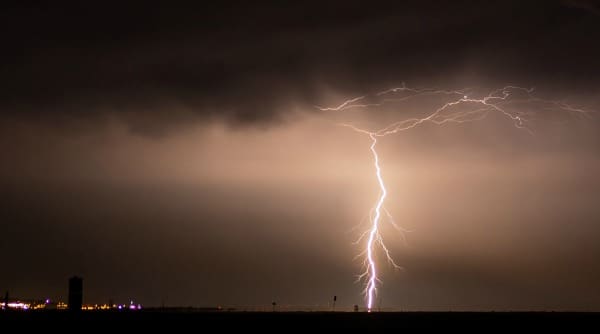When reading Scripture that mentions the wrath of God, most think of His wrath in human terms. But we must be clear that God does not get angry the way we do. Further, our God is not moody: pleasant and patient one moment and then angry and punishing the next. No, God does not suffer from mood swings or throw tantrums. God is love; stably, serenely, and consistently so.
So then what is God’s wrath? I have written on this topic in greater depth here: What is the Wrath of God? However, for this post, allow me to summarize by saying that God’s wrath is His “passion” to set things right. His wrath is His work to root out sin and injustice and bring forth holiness and righteousness.
Another thing to note about God’s wrath is that the anger is really more in us than in God. The wrath of God is our experience of the total incompatibility of our unrepentant sin before the holiness of God. It is like fire and water: they do not mix. And one can hear the wrathful conflict when fire and water come together. So the sinner in the presence of the all-holy God is going to experience a conflict. It is not so much that God is angry as that the sinner is incapable of enduring His glory, so bright and awesome. It is like wax before the fire.
In this post, I would like to explore how God’s wrath is also a work of revelation. St. Paul says, For the wrath of God is revealed from heaven against all ungodliness and unrighteousness of men who suppress the truth (Romans 1:18). And so St. Paul speaks of God’s wrath as being revealed, as being a work of revelation. As such, it exposes our injustice, error, and sin.
A text we read recently in the Liturgy of the Hours (from Isaiah Ch. 9) also develops God’s wrath as a kind of light of revelation, as a hand pointing out our iniquity. Within the longer passage below there is this refrain: For all this, his wrath is not turned back, and his hand is still outstretched! For indeed, God’s wrath casts a light on our wrongs and his outstretched hand points to them, revealing them and executing their results. Let’s consider Isaiah’s treatment of the revelatory wrath of God.
The Lord has sent word against Jacob,
it falls upon Israel;
And all the people know it,
Ephraim and those who dwell in Samaria,
those who say in arrogance and pride of heart,
“Bricks have fallen,
but we will build with cut stone;
Sycamores are felled,
but we will replace them with cedars.”
But the Lord raises up their foes against them
and stirs up their enemies to action:
Aram on the east and the Philistines on the west
devour Israel with open mouth.
For all this, his wrath is not turned back,
and his hand is still outstretched! (Is 9:8-12)
And thus we see that the wrath of God reveals in Israel a bold, prideful resistance to His warnings. “Bricks have fallen … [and] sycamores have been felled.” These were warnings from God that neither natural nor man-made structures can stand; they crumble under the weight of sin and injustice. Yet instead of heeding the warning, the people doubled-down on their sins, arrogantly thinking that they could replace what God had established with designs of their own.
For us today a similar pattern is evident, as our families crumble and we twist nature. But even seeing the darkness and deep confusion we have ushered in, we still do not seek God’s light again. Rather, our culture “doubles down” and arrogantly asserts that we can redefine marriage, family, sexuality, and even the nature of things themselves. We sweep aside the “bricks and sycamores” that God has established, thinking that we can do better with the stone and cedars of our imagining.
Having instructed Israel through His law and warned her to no avail, God handed Israel over to her enemies, just as today we are being handed over to the enemies of our rebellion: STDs, depopulation, divorce, cohabitation, sexual confusion of a colossal nature, the tragic loss of our children through abortion, the decline of our children (lack of discipline, lack of proper psychological formation) due to broken families—the list could go on and on.
When the text says that God “handed them over,” it means that He let them have their own way and allowed them to suffer the consequences. As would any loving father, God seeks first to teach and warn His children. Next, He resorts to punishments that seek to draw us back from the full impact of our sin. But if all these fail, He finally hands us over to our own designs.
When we experience wrath, we experience the total incompatibility of our sinful stance with the glory for which we were made. There comes on us, collectively and individually, a burning indignation toward God and any who represent Him or remind us of the truth for which we were made. We project our anger on God. But God is not angry. Rather, He has a passion, a will to set things right. His justice and love are one reality.
How is the wrath of God a work of revelation? It shows us the full consequences of our sinful rejection of God and His plan for us. The fact is, we grow weak and become easy prey for our enemies, both literal and figurative. For Ancient Israel this meant Aram and the Philistines. For us in the decaying, once-Christian West it means we become too weak to resist enemies like lust and greed. We can no longer make commitments and keep them; we have little self-control. These enemies devour our strength, cloud our minds, and erode our progress.
This wrathful condition is a revelation from God, showing us what we are when we reject His favor, His mercy, and His call to truth. As a work of revelation, there is always the hoped-for response: repentance. But, sadly, the text continues in this way:
The people do not turn to him who struck them,
nor seek the Lord of hosts.
And so the wrath continues, revealing to us in ever-deeper and darker tones the full depths of our condition, of our sad state. Sin grows; the young especially suffer from the sins of parents and elders. If we do not want grace, we will not have it; if we do not seek His mercy and grace, we will be increasingly without them. We cannot endure God’s holiness and justice apart from grace and mercy, and so we experience His holiness as wrath. This reveals to us our grave condition.
Time does not permit further commentary on the text below (from Isaiah). But as you read it, is there not a sobering sense that what is described is all too familiar? Is not this wrathful recitation a revelation?
The leaders of this people mislead them
and those to be led are engulfed.
For this reason, the Lord does not spare their young men,
and their orphans and widows he does not pity;
They are wholly profaned and sinful,
and every mouth gives vent to folly.
For all this, his wrath is not turned back,
his hand is still outstretched!
For wickedness burns like fire,
devouring brier and thorn;
It kindles the forest thickets,
which go up in columns of smoke.
At the wrath of the Lord of hosts the land quakes,
and the people are like fuel for fire;
No man spares his brother,
each devours the flesh of his neighbor.
Though they hack on the right, they are hungry;
though they eat on the left, they are not filled.
Manasseh devours Ephraim, and Ephraim Manasseh;
together they turn on Judah.
For all this, his wrath is not turned back,
his hand is still outstretched!
Woe to those who enact unjust statutes
and who write oppressive decrees,
Depriving the needy of judgment
and robbing my people’s poor of their rights,
Making widows their plunder,
and orphans their prey!
What will you do on the day of punishment,
when ruin comes from afar?
To whom will you flee for help?
Where will you leave your wealth,
Lest it sink beneath the captive
or fall beneath the slain?
For all this, his wrath is not turned back,
his hand is still outstretched!
Yes, as the text asks, what will we do on the day of full judgment? Even when we are in our worst state, God allows His wrath (our experience of His holy justice) to be a revelation to us, in the hope that before our final judgment we will finally call on Him. For on that day, the door of possible change will close and our condition will be final and forever fixed.
Woe to us that God’s wrath must be our revelation, his wrath is not turned back, his hand is still outstretched. Better for us to repent and allow His beautiful truth and mercy to be our light, our revelation. Have mercy on us, Lord. Give us added graces to repent!





